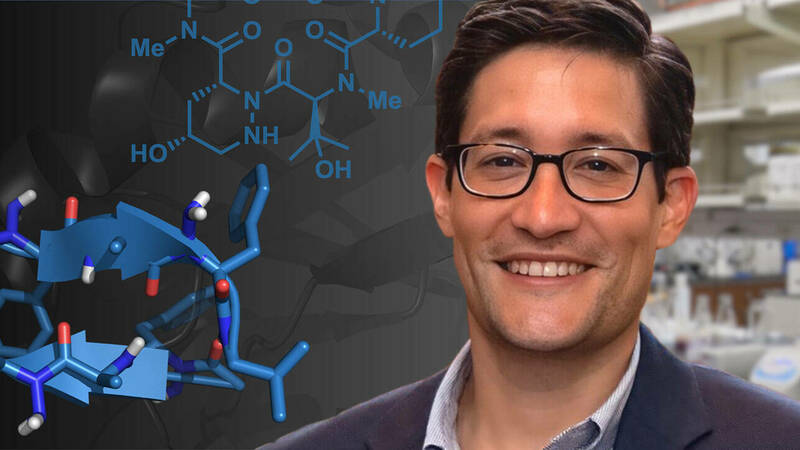
Juan Del Valle
W.K. Warren Family Professor for the Warren Family Research Center for Drug Discovery & Development; Associate Chair
- Office
- 240G McCourtney Hall
Notre Dame, IN 46556 - Phone
- +1 574-631-9864
- jdelvalle@nd.edu
Research Areas
- Biochemistry
- Organic Chemistry
Research Specialties
- Life Processes
- Medicine
- Synthesis
Prospective Graduate Students
Biography
| Year | Title |
|---|---|
| 2023-present | W.K. Warren Family Professor, Warren Family Research Center for Drug Discovery & Development, University of Notre Dame |
| 2019-2023 | William K. Warren Family Associate Professor, University of Notre Dame |
| 2015-2019 | Associate Professor, University of South Florida |
| 2009-2015 | Assistant Professor, University of South Florida and Moffitt Cancer Center |
| 2006-2008 | Assistant Professor, New Mexico State University |
| 2004-2006 | Postdoctoral Scholar, University of Montreal |
| 2004 | Ph.D. in Chemistry, University of California San Diego |
| 1999 | B.A. in Chemistry, Carleton College |
Selected Awards
2018 Undergraduate Teaching Award, University of South Florida
2010 CIBA Young Scientist Award, ACS Younger Chemists Committee
2010 Milestone Award, Miles for Moffitt Foundation
Research Interests
The Del Valle lab is broadly interested in bringing the power of organic chemistry to bear on current challenges in drug discovery and biomolecular recognition. Our research program lies at the interface of organic synthesis and chemical biology, with an emphasis on the structure-based design of biologically active peptidomimetics and small molecules. We view non-canonical peptides and stabilized protein folds as the ‘next wave’ in drug discovery, and we are working to realize their promise as potential therapeutics.
Modulators of neurodegenerative tau propagation
Several neurodegenerative diseases are characterized by misfolding and assembly of the tau protein into conformationally diverse fibrils. These fibrils can, in turn, spread from cell-to-cell leading to disease progression. We are pursuing the structure-based design and synthesis of tau mimics that can (1) nucleate elusive pathological folds, or (2) potently inhibit tau propagation across cells.
Synthesis and optimization of peptide natural products
Non-ribosomal peptides (NRPs) and ribosomally-synthesized post-translationally modified peptides (RiPPs) are promising classes of natural products with diverse biological activities. We are targeting the synthesis of several NRPs and RiPPs that harbor complex backbone modifications important for biological activity. Total synthesis provides a platform for the development of new methods and tactics, as well a launching point for conformation-activity relationship studies.
Peptide and protein mimics targeting PPIs
The development of molecules capable of disrupting protein-protein interactions (PPIs) remains a significant challenge. We are engaged in the design and synthesis of β-sheet mimics, stabilized polyproline II helices, and macrocyclic peptides, and in parsing the impact of chemical modifications on protein folding and stability. Our compounds are then employed to target PPIs that drive cancer, neurodegeneration, and infectious disease.
Selected Publications
- Angera, I. J.; Wright, M. M. and Del Valle, J. R. "Beyond N-Alkylation: Synthesis, Structure, and Function of N-Amino Peptides" 2024 Accounts of Chemical Research, ASAP. DOI: 10.1021/acs.accounts.4c00024.
- Anwar, A. F.; Cain, C. F.; Garza, M. J.; Degen, D.; Ebright, R. H. and Del Valle, J. R. "Stabilizing Pseudouridimycin: Synthesis, RNA Polymerase Inhibitory Activity, and Antibacterial Activity of Dipeptide-Modified Analogues" 2024 ChemMedChem, 19 (1), e202300474. DOI: 10.1002/cmdc.202300474.
- Zhu, R. Y.; Makwana, K. M.; Zhang, Y. W.; Rajewski, B. H.; Del Valle, J. R. and Wang, Y. C. "Blocking Tau Transmission by Biomimetic Graphene Nanoparticles" 2023 Journal of Materials Chemistry B, 11 (31), pp.7378-7388. DOI: 10.1039/d3tb00850a.
- Rajewski, B. H.; Wright, M. M.; Gerrein, T. A. and Del Valle, J. R. "N-Aminoglycine and its Derivatives Stabilize PPII Secondary Structure" 2023 Organic Letters, 25 (23), pp.4366-4370. DOI: 10.1021/acs.orglett.3c01502.
- Elbatrawi, Y. M.; Gerrein, T.; Anwar, A.; Makwana, K. M.; Degen, D.; Ebright, R. H. and Del Valle, J. R. "Total Synthesis of Pargamicin A" 2022 Organic Letters, 24 (50), pp.9285-9289. DOI: 10.1021/acs.orglett.2c03861.
- Shao, A. D.; Xu, Q.; Kang, C. W.; Cain, C. F.; Lee, A. C.; Tang, C.; Del Valle, J. R. and Hu, C. "IRE-1-Targeting Caged Prodrug with Endoplasmic Reticulum Stress-Inducing and XBP-1S-Inhibiting Activities for Cancer Therapy" 2022 Molecular Pharmaceutics, 19 (4), pp.1059-1067. DOI: 10.1021/acs.molpharmaceut.1c00639.